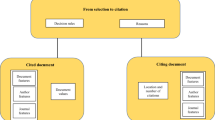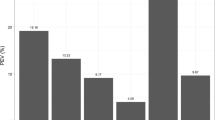Abstract
The g index was introduced by Leo Egghe as an improvement of Hirsch’s index h for measuring the overall citation record of a set of articles. It better takes into account the highly skewed frequency distribution of citations than the h index. I propose to sharpen this g index by excluding the self-citations. I have worked out nine practical cases in physics and compare the h and g values with and without self-citations. As expected, the g index characterizes the data set better than the h index. The influence of the self-citations appears to be more significant for the g index than for the h index.
Similar content being viewed by others
References
J. E. Hirsch, An index to quantify an individual’s scientific research output, Proc. Natl. Acad. Sci. U.S.A., 102 (2005) 16569–16572.
S. B. Popov, A parameter to quantify dynamics of a researcher’s scientific activity, arXiv:physics/0508113.
S. Lehmann, A. D. Jackson, B. Lautrup, Measures and mismeasures of scientific quality, arXiv:physics/0512238 and Measures for measures, Nature, 444 (2006) 1003–1004.
P. D. Batista, M. G. Campiteli, O. Kinouchi, A. S. Martinez, Is it possible to compare researchers with different scientific interests? Scientometrics, 68 (2006) 179–189.
L. Egghe, Theory and practise of the g-index, Scientometrics, 69 (2006) 131–152.
I. Podlubny, K. Kassayova, Towards a better list of citation superstars: compiling a multidisciplinary list of highly cited researchers, Research Evolution, 15 (2006) 154–162.
L. Meho, The rise and rise of citation analysis, Physics World, 20(1) (2007) 32–36.
B. H. Jin, H-index: An evaluation indicator proposed by scientist, Science Focus, 1 (2006) 8–9.
L. Egghe, An improvement of the h-index: the g-index, ISSI Newsletter, 2 (2006) 8–9.
L. Egghe, How to improve the h-index, Scientist, 20 (2006) 14.
R. Rousseau, Simple models and the corresponding h-and g-index, Science Technology Development, to appear (2007); http://eprints.rclis.org/archive/00006153.
H. L. Roediger, The h index in science: A new measure of scholarly contribution, APS Observer, 19(4) (2006).
D. W. Aksnes, A macro-study of self-citation, Scientometrics, 56 (2003) 235–246.
H. Snyder, S. Bonzi, Patterns of self-citation across disciplines, Journal of Information Science, 24(6) (1998) 431–435.
W. Glänzel, B. Thijs, B. Schlemmer, A bibliometric approach to the role of author self-citations in scientific communication, Scientometrics, 59 (2004) 63–77.
M. Schreiber, Self-citation corrections for the Hirsch index, EPL, 78 (2007) 30002: 1–6.
C. D. Kelly, M. D. Jennions, The h index and career assessment by numbers, Trends in Ecology and Evolution, 21 (2006) 167–170.
B. Cronin, L. Meho, Using the h-index to rank influential information scientists, J. Am. Soc. Inf. Sci. Techn., 57 (2006) 1275–1278.
M. Schreiber, A case study of the Hirsch index for 26 non-prominent physicists, Annalen der Physik (Leipzig), 16 (2007) 640–652.
M. Schreiber, To share the fame in a fair way h m modifies h for multi-authored manuscripts, New Journal of Physics, 10 (2008) 040201: 1–9.
Author information
Authors and Affiliations
Corresponding author
Rights and permissions
About this article
Cite this article
Schreiber, M. The influence of self-citation corrections on Egghe’s g index. Scientometrics 76, 187–200 (2008). https://doi.org/10.1007/s11192-007-1886-6
Received:
Published:
Issue Date:
DOI: https://doi.org/10.1007/s11192-007-1886-6




